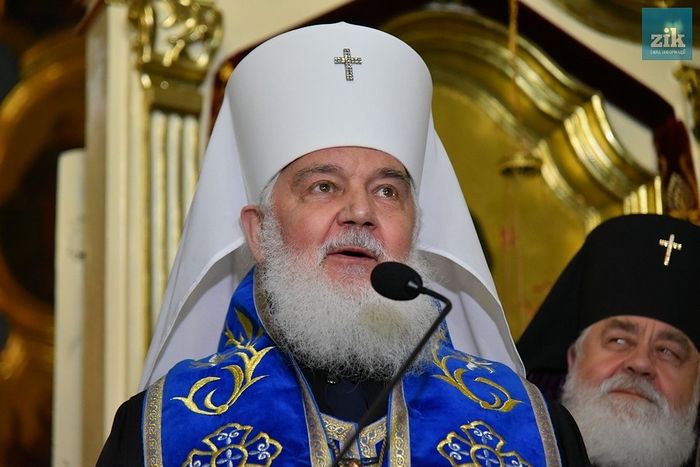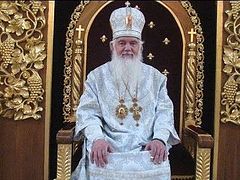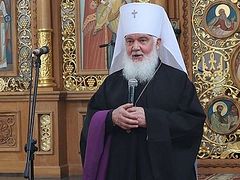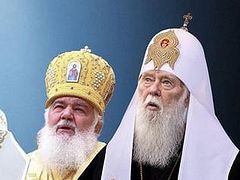Kiev, August 21, 2019
The faithful of the canonical Ukrainian Orthodox Church and of the Orthodox Church throughout the world have recognized the “Orthodox Church of Ukraine” (OCU) as a nationalist political creation ever since former President Petro Poroshenko and Patriarch Bartholomew teamed up to create the new organization in April 2018.
Poroshenko himself declared many times that the purpose of the creating the new structure was first and foremost to strike at Russia, which he considered an aggressor country. He even spoke of overcoming the “Moscow demons.” Since the merger of the “Kiev Patriarchate” (KP) and the “Ukrainian Autocephalous Orthodox Church” (UAOC) in December, the OCU has mainly grown through nationalist terrorist groups beating up priests and women and forcibly seizing their churches.
While the public face of the Ukrainian nationalist schismatic movement for 30 years was “Patriarch” Philaret Denisenko, the head of the KP, who himself has had no qualms about openly expressing his disgust for all thing Russian ever since he was passed over for the Patriarchal throne in the early 1990s, the relatively quieter Makary Maletich, formerly the head of the much smaller UAOC, has his own similar motivations.
In a recent interview with the Religious Information Service of Ukraine, Maletich spoke of how the OCU can more effectively gain parishes—for the sake of more seriously wounding the Russian Orthodox Church—a Church with which the OCU supposedly hopes to enter into communion. OCU primate “Metropolitan” Epiphany Dumenko commemorates His Holiness Patriarch Kirill of Moscow and All Russian in the services, though at the instruction of Patriarch Bartholomew of Constantinople.
Thus, Maletich explained that OCU hierarchs, clergy, and laity should not try to force parish transitions from the canonical Church to the OCU, as has been happening since December (and earlier with representatives of the predecessor KP and UAOC), but should meet with the clergy and people of the canonical Church to build relations, and let the conversions happen naturally.
“I believe that the distribution between the OCU and the UOC-MP [the canonical Church—Ed.] is temporary… 75% of Ukrainians have decided and want Local Orthodox Church. But they are waiting. They are restrained by Russian slander and stupidity; they are restrained by priests. The OCU should not entice, but work, meet with the clergy, and everything will be alright,” said Makary, appealing to a uniquely Ukrainian-nationalist view of the situation.
As of June last year, when plans for creating the OCU were well underway, less than 1/3 of Ukrainians supported the creation of an autocephalous Local Church. Moreover, Maletich’s words reveal a political way of understanding the life of the Church, blaming the stagnation of the OCU on outside Russian influence. Conversely, not only the Russian Church, but every Local Orthodox Church has as yet refused to enter into communion with the OCU, precisely on the basis of spiritual criteria.
“We shouldn’t work through someone, to divide parishes. We should work with the clergy, so they would transfer in unity,” Makary explained.
“This will be a blow to the Russian Orthodox Church,” Makary added. “And such work should be sincere, open.”
He also called for the OCU to work with the bishops of the canonical Church, although, he notes, the pride of OCU bishops has too great an influence for such an endeavor to bear fruit at this time.




